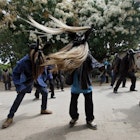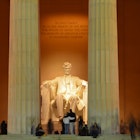
Nov 27, 2024 тЂ 7 min read

The iconic green dome of the Prophet's Mosque now dominates the skyline in Madinah ТЉ Tharik HussainТ / РЯАФУХСљКЯВЪПЊНБМЧТМ
In the final instalment of the Hajj Diaries, Tharik documents his visit to Madinah before returning home to London and contemplating the effect his experience in Saudi Arabia has had on him.

If Makkah represents the chaos of the Hajj, then Madinah represents the peace and serenity of an oasis. Ever since the 7th century, these two cities have been intertwined in a symbiotic narrative; Makkah was where the Prophet Muhammad was born, but also where he was rejected, whilst it was Madinah that took him in, gave him refuge, and a final resting place.
The green dome of the Prophetтs Mosque, which dominates the centre of Madinah, now sits above that spot.
Built by the Ottomans in 1817, it is one of the mosqueтs few remaining historic structures.
тThey say, when the wahhabis tried to destroy it, those that climbed up to do this fell to their deaths and they took this as a sign to leave it alone,т said an old man from England, as I sat admiring the mosqueтs iconic skyline on my first day in the city.
The dome, he explained, was where the Prophetтs house had once stood, when the whole of Madinah was no bigger than the size of the Grand Mosque today. Beneath it was the Prophetтs tomb, alongside that of two caliphs, Abu Bakr and Omar Ibn al-Khattab.

тThey say thereтs also a fourth grave, an empty one reserved for Isa т Jesus т for his return.т
Visiting the tombs to pay our respects is the main reason Muslims combine their pilgrimage with a visit to Madinah.
Our arrival coincided with a Friday, and around midday, I found myself heading to the mosque for the jumma prayer with our Sheikh and Fouaz, one of our tour operators, who had been born in Madinah.
тThatтs where we used to play football,т said Fouaz, pointing to one of the huge pillars, topped by an enormous, white parasol. The tall monoliths spread their motorised wings every morning, like mechanical creatures from a sci-fi movie, to offer worshippers shade from the blazing Saudi sun.
тAnd over there...т added Fouaz, pointing to the south western corner, тwas where my house used to be. Itтs all changed now.т
Fouaz had been with us throughout the Hajj dealing with logistics. Not the warmest of characters, he had often appeared agitated and impatient, but now with the Hajj over, Fouaz was different. He was home.
As we waited for the start of the prayer on the mosqueтs roof, the Sheikh т also back in the city where he had been a student т lay reclined and relaxed.
Soon the ikhama was announced and I slowly got up to stand beside my Sheikh one last time. A cool breeze drifted through the canopied rooftop and as I raised my hands to begin the prayer, I silently thanked the Sheikh for being my Hajj teacher.
Somewhere up ahead lay the body of the man who had taught us all, and when we knelt on the ground, I thanked him too, as did every other worshipper.

The nature of pilgrimage is such that for a brief period we exist in a magical bubble. Buoyed by religious fever and pious company, it becomes easy to fulfil obligations normally so challenging. We make prayers on time, behave in a pious manner, and remember God in our every action.
The end of a pilgrimage is therefore always difficult.
Leaving that bubble to return to our normal lives, we find the daily challenges we had left behind remain, and many of us also experience the inevitable low that follows such a spiritual тhighт.
In the days after I returned to the UK, I sensed this in all of us. My mother was tearful that she may never see the Kaaba again, but also deeply grateful that I had taken her тone last timeт.
Others I spoke to also felt low, for different reasons.
тI sometimes wish I had done more,т said my cousin, Raf, as we headed down a busy dual carriageway in north London, to play football one evening.
It had been almost two weeks since our return.
тI wish I had spent more time praying in the haram, making the most of being there, you know, reaping the rewards.т

Raf was alluding to a well known tradition; to pray inside the Grand Mosques amplified the reward attached to those prayers. We had tried to do this for most of the congregational prayers, but the exhausting Hajj schedule, combined with tending to our parents, meant that at times we simply needed to rest, so our bodies could recover.
What had seemed necessary to ensure we remained well enough to care for our mothers, Raf now saw as missed opportunities.
тWe will always have regrets when we come back from a pilgrimage bro, but maybe we should look at this one differently,т I offered.
Raf seemed unsure.
The sky was a beautiful pinkish red and in the rearview mirror we could make out the start of a stunning sunset. I pointed it out to Raf.
тBeautiful, isnтt it?т
He glanced at his mirrors.

тMaybe on this trip, the greatest reward was in the ordinary; pushing your motherтs wheelchair, making sure she took her medicine on time; always had food; could go to the toilet and was able to perform her Hajj rites, without fear or difficulty. Maybe, the real reward lay in those selfless acts?т
We had both sacrificed personal moments of reflection and spirituality to be with our mothers; the times when we might have otherwise completely immersed ourselves in a Hajj rite, or ventured down to the Grand Mosque to sit alone with the Kabaa, had been given up to ensure they could also fulfil their rites.
Raf looked straight ahead, and said nothing. In front of us, the traffic was building, as we approached our junction.
тI guess you have a point, bro,т he finally said.
I stared at the sky and decided not to push him, accepting we processed things differently.
But as we drove towards an indulgence we had enjoyed since our childhoods together; one where we could play and forget all the serious obligations life and religion asked of us, I felt extremely thankful.
I was thankful that God had made it easy for us both to be Hajj guardians for our mothers. I felt thankful that I was able to deliver, at Arafat, the requests people had asked of me, and I was thankful we were all back with our loved ones, in good health. After an extraordinary experience, I sat in that car beside my cousin, most thankful for the ordinary.
Catch up on the first five instalments now:


Nov 27, 2024 тЂ 7 min read







